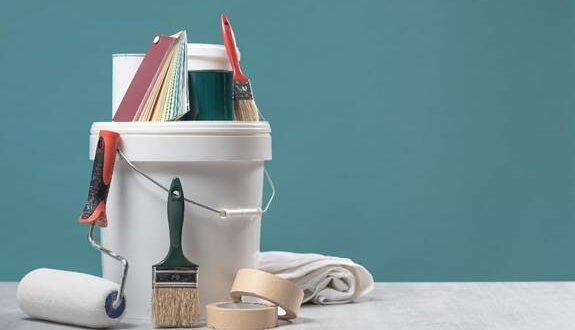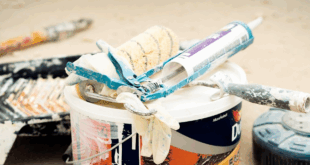We’ve heard it all before – “Follow this simple, beginner’s guide and put up shelves in as little as five minutes,” when in reality it takes us five minutes just to find the hammer. What we’re trying to say is this: most of these renovation tasks need a bit of a reality check.
To put together a guide that’s actually accurate, we spoke to heritage renovations and aluminium windows expert Kevin Brown from The Heritage Window Company, who’s put together a list of beginner-accurate estimations that you can complete over a weekend.
Stripping wallpaper (6–8 hours per room)
“Stripping wallpaper always takes longer for beginners than guides like to estimate, averaging between four to six hours depending on the room size,” says Kevin. “Where time is often lost by beginners is in the process of softening the adhesive to strip the paper, as some complications can lead to hours of rewetting.
“Vinyl coatings are the biggest offender here, with most guides omitting the need to remove this before the paper beneath can be properly stripped. For thin coatings that resist removal, sanding the surface thoroughly is essential so water can penetrate and reactivate the adhesive. Once prepped, soak a large section of wall with warm water three times, allowing it to fully penetrate. Then, using a broad knife at a shallow angle, you can lift the paper off in large sections — surprisingly clean if the wall was primed well,” Kevin explains. “This can be a long, tiring and arduous process for beginners, so be aware of this before you begin for the day and take plenty of breaks.”
Laying vinyl flooring (8–12 hours per room)
“Understandably, most don’t want to attempt flooring themselves – but vinyl flooring is seen as an easier jumping-in point, mainly thanks to its soft-cut nature and cheaper starting price,” Kevin explains. “This fact leads many to underestimate how finicky vinyl flooring can be with little to no experience, leading to longer install times as newcomers struggle to accurately fit vinyl in bathrooms.
“Careful measuring, cutting around corners, toilets, skirting boards and ensuring a perfectly level subfloor takes incredible patience and time – especially for a newcomer. Mistakes can result in bubbles, uneven seams, or lifted edges, all of which would then require rework. For beginners, it’s a full-day task for even a modest room.”
Painting walls (6–8 hours per room)
“Easy to learn but hard to master, painting walls is a strenuous task that will take non-decorators longer than the pros normally estimate,” Kevin says. “Where most go wrong is in the tidying-up of little edges and ancillaries, especially if they make the time-costly mistake of not bordering-off areas with decorating tape beforehand.
“Obviously, the size of the room plays a real factor, but most average DIYers can expect to spend between six to eight hours painting their walls – including leaving time for drying.”
Self-adhesive tiling (2–4 hours)
“Self-adhesive tiles feel like a quick win, especially with the amount of TikToks out there promising professional results without the technical know-how, but beginners often underestimate the care needed for a neat result,” says Kevin.
“Even though you’re skipping the adhesive and grouting, preparing the surface is critical. You must clean any wall or surface, such as a kitchen splashback or shower wall, so that it’s perfectly clean, smooth and dry.
Next, you’re measuring, cutting around edges and carefully aligning tiles to avoid gaps or uneven rows, which can take several hours depending on the size of the space. For a small section, such as a kitchen splashback, expect a couple hours of work – but for a full bathroom wall, this can take upwards of four hours for a beginner, depending on complexity.
“Take your time pressing each tile firmly and checking alignment – it’s much easier to get it right the first time than to try to reposition them later.”
Replacing taps (1–2 hours)
“For beginners, replacing a tap isn’t a 15-minute job, like some guides like to claim,” says Kevin. “For a standard bathroom or kitchen sink tap, a complete beginner can usually complete the job in an hour or two.
“The main steps are shutting off the water, removing the old tap, carefully fitting the replacement and testing for leaks afterwards. The main challenges come from stiff fittings, awkward access or minor adjustments due to unrefined technique,” Kevin continues. “For pros, this simple task becomes an almost daily occurrence, making a tap replacement as simple as muscle memory. For beginners, you’ll want to be taking your time and checking each connection as you go, ensuring a secure, leak-free finish.”
Unblocking a sink (1 hour)
“Clearing a blocked sink by taking apart the U-bend is a simple but often intimidating task for beginners,” says Kevin. “For most standard sinks, the process shouldn’t take more than half an hour to an hour. The steps are straightforward: place a bucket underneath to catch water, carefully loosen the slip nuts, remove the U-bend and clear out the debris. Many beginners lose time fumbling with tight fittings or spilling water, so having the right tools and working slowly is key. Once cleaned, reassemble carefully and check for leaks. It’s quick work if done methodically, and it saves calling out a plumber for what’s usually a minor blockage.”
 Homeowners Club If you are one of the 15 million homeowners in the UK, the free to join online Homeowners Club is for you.
Homeowners Club If you are one of the 15 million homeowners in the UK, the free to join online Homeowners Club is for you.









